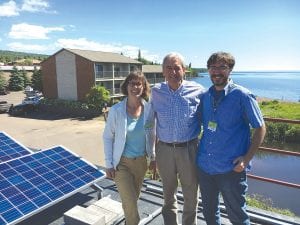One stop by Congressman Rick Nolan on his whirlwind visit to Cook County was on the roof of the Cook County Whole Foods Co-op! Nolan checked out the new solar panels on the co-op roof. (L-R) Co-op Manager Jennifer Stoltz, Congressman Nolan, and Co-op Marketing and Education Coordinator Reed Schmidt.

U.S. Congressman Rick Nolan visited Cook County on June 27-28, meeting with members of the Cook County Chamber of Commerce at Surfside Resort in Tofte on Monday evening. On Tuesday, the Congressman stopped by WTIP Community Radio for an interview before taking part in a tourism roundtable at North House Folk School. He rounded out his visit with a tour of the existing Border Patrol building in Grand Marais and a climb onto the roof of the Cook County Whole Foods Co-op to check out the solar panels being installed.
Somewhere in between all the activity, Representative Nolan found time to stop by Sydney’s Frozen Custard for a treat.
At the Tourism Roundtable at North House, in front of the backdrop of the beautiful Grand Marais harbor, Nolan said he recognized the importance of the northern border. He said Grand Marais is not only a favorite Minnesota destination, but that it is an internationally known location. “So, I want to hear from you,” he said to the members of the tourism community in attendance.
Cook County Commissioner Heidi Doo-Kirk asked Nolan to return to the county to meet with the county board. She said there were many issues that the board would like to discuss, such as out-of-home placement costs for public health, housing, mining and more. However, she said her primary request at this time was to help the U.S. Border Patrol obtain a new building. She said the current building being used is in a residential area without adequate storage space or security—or even privacy when using the restroom. Doo-Kirk said as a small community, Cook County doesn’t need a huge Homeland Security facility. But, the local agents need reasonable working space.
Doo-Kirk said, “We really need to respect them and give them the facility they need.”
Nolan told Doo-Kirk and the others seeking assistance that Congress no longer has “earmarks” for special projects. However, he said only 65 cents of every dollar sent to Washington, D.C., is returned to Minnesota. Noting that some states see a return of $5 or $6 for every dollar, he said, “I’ve been on a personal mission to change that.”
Doo-Kirk headed off to the county board meeting and other attendees raised their concerns. Grand Marais Mayor Jay Arrowsmith DeCoux talked about the struggle to create affordable housing, pointing out that rural areas have a difficult time meeting the parameters for federal programs.
Chamber Director Jim Boyd agreed, telling Nolan that part of the problem is that half of the housing in Cook County is seasonal. He said there are some benefits to that for the tax base, but it makes things difficult for young families.
Boyd also talked about transportation concerns, including the forest roads once used for logging that are now the backbone of the recreation outside the Boundary Waters Canoe Area Wilderness. He said because of lack of money to maintain those vital forest roads, the county’s forest and trail system were becoming non-existent.
Cook County/Grand Marais Economic Development Authority Chair Howard Hedstrom agreed, noting that the government should not be acquiring new land when it cannot keep up with the management of the land it now has.
Nolan shook his head at the number of “unmet needs” in the United States and said that is why he works so hard to put an end to “nation building.” He recited a list of things that could be done in the United States with the trillions of dollars that had been spent on wasteful projects in Iraq, Syria, Yemen and “who knows where else.”
There was considerable discussion about immigration and the visas required for the international workers that are crucial to Cook County’s economy. The conversation touched briefly on the costs of education and what can be done.
As the schooner Hjordis sailed by outside, talk continued with a request from Grand Portage Tribal Chair Norman Deschampe to make reasonable adjustments to the federal standards for mercury emissions. Deschampe said the most recent standards could shut down the state-of-the-art water treatment infrastructure in Grand Portage. Grand Marais Mayor Arrowsmith DeCoux concurred.
Deschampe also asked Nolan to do what he can to prevent the moose from being placed on the Endangered Species List. Deschampe said Grand Portage is concerned that listing the moose could lead to a halt to logging or some other drastic measure that could ultimately hurt the moose population.
Nolan noted that a perfect example of people with good intentions coming up with bad ideas was with the northern long-eared bat. He said the answer was not shutting down logging. He said the bat needed protection, but from a virus, not from the timber industry.
He said he agreed that putting the moose on the Endangered Species List is not the way to save the moose.
Nolan expressed concern about the “nature deficit” in the county and noted that is why he was so pleased to be back in Minnesota.
After visiting Grand Marais, Nolan headed to Virginia, Minnesota where he met with the Iron Range state legislative delegation, the Range Association of Municipalities & Schools, and members of the Iron Range Building Trades. Nolan joined those entities in asking the U.S. Forest Service to hold a listening session on the Iron Range regarding its decision on renewal of two proposed mineral leases.


Loading Comments